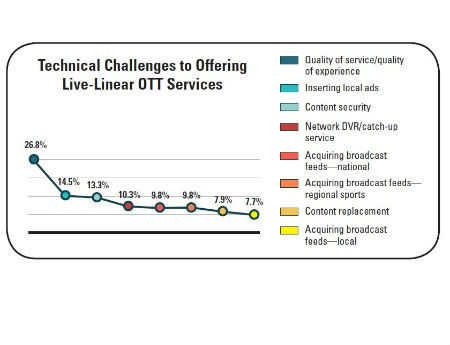Live OTT Viewing Expected to Eclipse Broadcast TV in Five Years: Survey
The smarter way to stay on top of the multichannel video marketplace. Sign up below.
You are now subscribed
Your newsletter sign-up was successful

Viewing hours of live OTT video is expected to overtake traditional broadcast TV, according to hundreds of industry pros who participated in a survey/study by Level 3 Communications, Streaming Media and Unisphere Research.
The 2017 edition of the annual OTT Video Services, based on answers from 486 “media industry professionals” (with 70% based in North America, 16% in Europe, 9% in Asia Pacific and 5% from South America), found that nearly 70% believe that OTT will cross that threshold no later than 2022.
The study also asked about the technical challenges faced by live-linear OTT services (see chart), and the most popular response, at 26.8%, was quality of service/quality of experience, followed by local ad insertion (14.5%), content security (13.3%) and network DVR/catchup services (10.3%).
“Engagement,” at 22.7%, was viewed as the most key performance metric used for OTT business decisions, followed by buffering (20.3%), latency/jitter (15.7%), abandonment rate and bitrate (time-weighted) (both at 14.2%) and video start failures (13.1%).
Notably, linear channel OTT content was rated as very important to OTT business plans by 42% of respondents, ahead of per-event and VOD content.
Respondents also offered insight on content delivery network strategies. About 47% said they use a multiple-CDN approach, up from 40% in last year’s study, and 30% had a single-CDN strategy, and 22% operated their own internal CDN.
“In-house CDN delivery presents a challenge for pure-play CDN companies, as they lack the ability to sell basic services such as IP transport that traditional telecoms can use to offset the cost of their CDN infrastructure,” the study explained.
The smarter way to stay on top of the multichannel video marketplace. Sign up below.
About half said they plan to offer both High Dynamic Range and High Frame Rate formats, with one-third saying they were uncertain about 4K or had no plans to support 4K.
Some 47% said they are not considering VR-focused video, but more than half said they are actively researching it, plan to launch a VR video service soon, or have launched on already.
